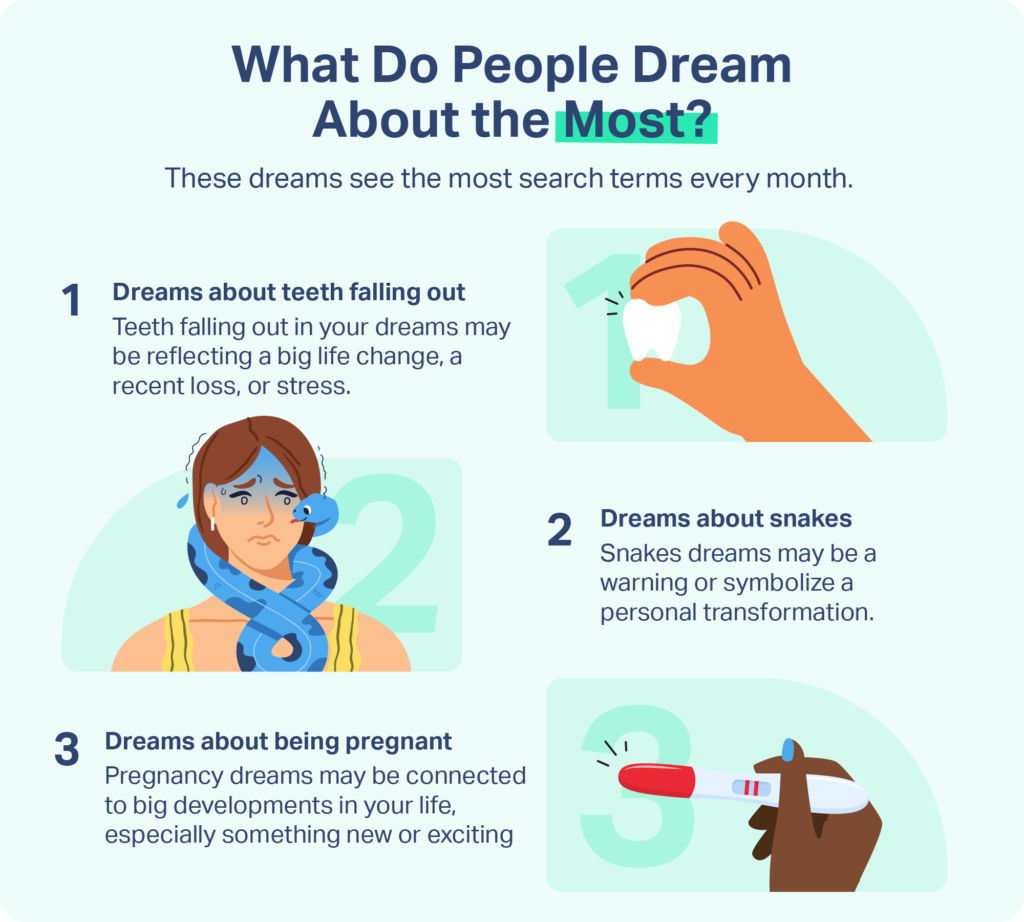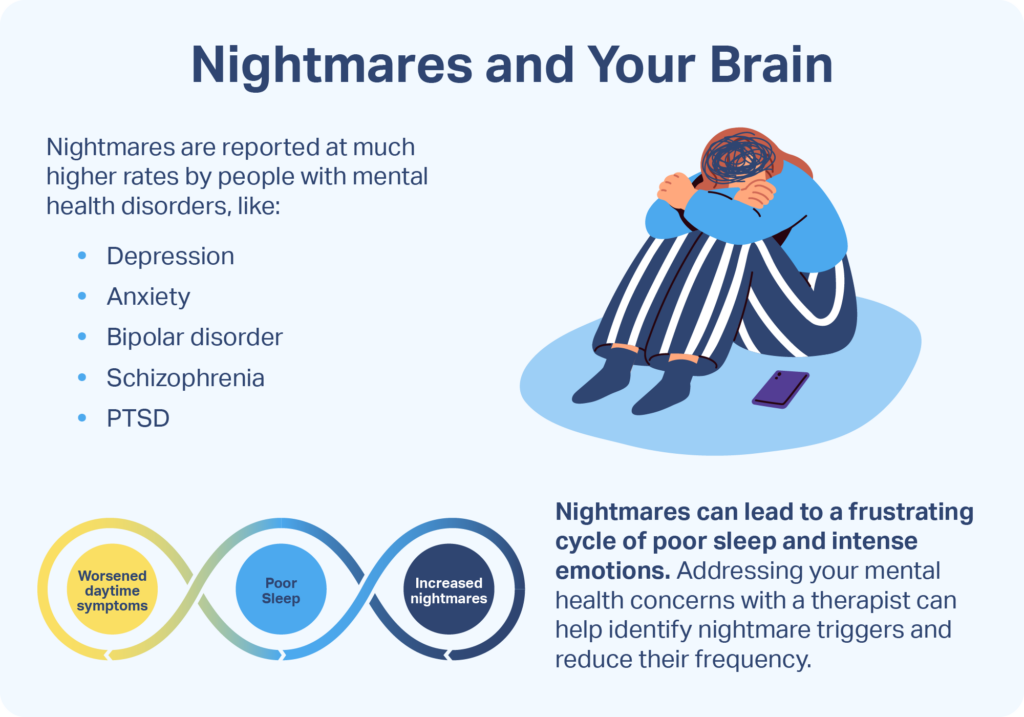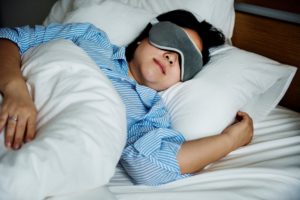Dreams: Why They Happen & What They Mean
- Dreams are mental, emotional, or sensory experiences that take place during sleep.
- Dreams are the most common and intense during REM sleep when brain activity increases, but no one knows for sure why we dream.
- Dreaming is normal and healthy, but frequent nightmares can interfere with sleep.
- Waking up gradually and journaling your dreams may help you remember them better.
Dreams are one of the most fascinating and mystifying aspects of sleep. Since Sigmund Freud helped draw attention to the potential importance of dreams in the late 19th century, considerable research has worked to unravel both the neuroscience and psychology of dreams.
Despite this advancing scientific knowledge, there is much that remains unknown about both sleep and dreams. Even the most fundamental question — why do we dream at all? — is still subject to significant debate.
While everyone dreams, the content of those dreams and their effect on sleep can vary dramatically from person to person. Even though there’s no simple explanation for the meaning and purpose of dreams, it’s helpful to understand the basics of dreams, the potential impact of nightmares, and steps that you can take to sleep better with sweet dreams.
Is Your Troubled Sleep a Health Risk?
A variety of issues can cause problems sleeping. Answer three questions to understand if it’s a concern you should worry about.
What Are Dreams?
Dreams are images, thoughts, or feelings that occur during sleep. Visual imagery is the most common , but dreams can involve all of the senses. Some people dream in color while others dream in black and white, and people who are blind tend to have more dream components related to sound, taste, and smell .
Studies have revealed diverse types of dream content, but some typical characteristics of dreaming include:
- It has a first-person perspective.
- It is involuntary.
- The content may be illogical or even incoherent.
- The content includes other people who interact with the dreamer and one another.
- It provokes strong emotions.
- Elements of waking life are incorporated into content.
Although these features are not universal, they are found at least to some extent in most normal dreams.
Why Do We Dream?
Debate continues among sleep experts about why we dream. Different theories about the purpose of dreaming include:
- Building memory: Dreaming has been associated with consolidation of memory, which suggests that dreaming may serve an important cognitive function of strengthening memory and informational recall.
- Processing emotion: The ability to engage with and rehearse feelings in different imagined contexts may be part of the brain’s method for managing emotions.
- Mental housekeeping: Periods of dreaming could be the brain’s way of “straightening up,” clearing away partial, erroneous, or unnecessary information.
- Instant replay: Dream content may be a form of distorted instant replay in which recent events are reviewed and analyzed.
- Incidental brain activity: This view holds that dreaming is just a by-product of sleep that has no essential purpose or meaning.
Experts in the fields of neuroscience and psychology continue to conduct experiments to discover what is happening in the brain during sleep, but even with ongoing research, it may be impossible to conclusively prove any theory for why we dream.
When Do We Dream?
On average, most people dream for around two hours per night. Dreaming can happen during any stage of sleep, but dreams are the most prolific and intense during the rapid eye movement (REM) stage.
During the REM sleep stage, brain activity ramps up considerably compared to the non-REM stages, which helps explain the distinct types of dreaming during these stages. Dreams during REM sleep are typically more vivid, fantastical, and/or bizarre even though they may involve elements of waking life. By contrast, non-REM dreams tend to involve more coherent content that involves thoughts or memories grounded to a specific time and place.
REM sleep is not distributed evenly through the night. The majority of REM sleep happens during the second half of a normal sleep period, which means that dreaming tends to be concentrated in the hours before waking up.

Do Dreams Have Meaning?
How to interpret dreams, and whether they have meaning at all, are matters of considerable controversy. While some psychologists have argued that dreams provide insight into a person’s psyche or everyday life, others find their content to be too inconsistent or bewildering to reliably deliver meaning.
Virtually all experts acknowledge that dreams can involve content that ties back to waking experiences although the content may be changed or misrepresented. For example, in describing dreams, people often reference people who they recognize clearly even if their appearance is distorted in the dream .
The meaning of real-life details appearing in dreams, though, is far from settled. The “continuity hypothesis” in dream research holds that dreams and waking life are intertwined with one another and thus involve overlapping themes and content. The “discontinuity hypothesis,” on the other hand, sees thinking during dreams and wakefulness as structurally distinct.
While analysis of dreams may be a component of personal or psychological self-reflection, it’s hard to state, based on the existing evidence, that there is a definitive method for interpreting and understanding the meaning of dreams in waking, everyday life.

What Are Types of Dreams?
Dreams can take on many different forms. Lucid dreams occur when a person is in a dream while being actively aware that they are dreaming. Vivid dreams involve especially realistic or clear dream content. Bad dreams are composed of bothersome or distressing content. Recurring dreams involve the same imagery repeating in multiple dreams over time.
Even within normal dreams, there are certain types of content that are especially identifiable. Among the most recognizable and common themes in dreams are things like flying, falling, being chased, or being unable to find a bathroom.
What Are Nightmares?
In sleep medicine, a nightmare is a bad dream that causes a person to wake up from sleep . This definition is distinct from common usage that may refer to any threatening, scary, or bothersome dream as a nightmare. While bad dreams are normal and usually benign, frequent nightmares may interfere with a person’s sleep and cause impaired thinking and mood during the daytime.

Do Dreams Affect Sleep?
In most cases, dreams don’t affect sleep. Dreaming is part of healthy sleep and is generally considered to be completely normal and without any negative effects on sleep.
Nightmares are the exception. Because nightmares involve awakenings, they can become problematic if they occur frequently. Distressing dreams may cause a person to avoid sleep, leading to insufficient sleep. When they do sleep, the prior sleep deprivation can induce a REM sleep rebound that actually worsens nightmares. This negative cycle can cause some people with frequent nightmares to experience insomnia as a chronic sleep problem.
For this reason, people who have nightmares more than once a week, have fragmented sleep, or have daytime sleepiness or changes to their thinking or mood should talk with a doctor . A doctor can review these symptoms to identify the potential causes and treatments of their sleeping problem.
How Can You Remember Dreams?
For people who want to document or interpret dreams, remembering them is a key first step. The ability to recall dreams can be different for every person and may vary based on age . While there’s no guaranteed way to improve dream recall, experts recommend certain tips :
- Think about your dreams as soon as you wake up. Dreams can be forgotten in the blink of an eye, so you want to make remembering them the first thing you do when you wake up. Before sitting up or even saying good morning to your bed partner, close your eyes and try to replay your dreams in your mind.
- Have a journal or app on-hand to keep track of your dream content. It’s important to have a method to quickly record dream details before you can forget them, including if you wake up from a dream in the night. For most people, a pen and paper on their nightstand works well, but there are also smartphone apps that help you create an organized and searchable dream journal.
- Try to wake up peacefully in the morning. An abrupt awakening, such as from an alarm clock, may cause you to quickly snap awake and out of a dream, making it harder to remember the dream’s details.
- Remind yourself that dream recall is a priority. In the lead-up to bedtime, tell yourself that you will remember your dreams, and repeat this mantra before going to sleep. While this alone can’t ensure that you will recall your dreams, it can encourage you to remember to take the time to reflect on dreams before starting your day.
How Can You Stop Nightmares?
People with frequent nightmares that disturb sleep should talk with a doctor who can determine if they have nightmare disorder or any other condition affecting their sleep quality. Treatment for nightmare disorder often includes talk therapy that attempts to counteract negative thinking, stress, and anxiety that can worsen nightmares.
Many types of talk therapy attempt to reduce worries or fears, including those that can arise in nightmares. This type of exposure or desensitization therapy helps many patients reframe their emotional reaction to negative imagery since trying to simply suppress negative thoughts may exacerbate nightmares .
Another step in trying to reduce nightmares is to improve sleep hygiene, which includes both sleep-related habits and the bedroom environment. Healthy sleep hygiene can make your nightly sleep more predictable and may help you sleep soundly through the night even if you have bad dreams. Examples of healthy sleep tips include:
- Follow a stable sleep schedule: Keep a steady schedule every day, including on weekends or other days when you don’t have to wake up at a certain time.
- Choose pre-bed content carefully: Avoid scary, distressing, or stimulating content in the hours before bed since it may provoke negative thoughts during sleep.
- Wind down each night: Exercising during the day can help you sleep better at night. In the evening, try to allow your mind and body to calmly relax before bed such as with light stretching, deep breathing, or other relaxation techniques.
- Limit alcohol and caffeine: Drinking alcohol can cause more concentrated REM sleep later in the night, heightening the risk of nightmares. Caffeine is a stimulant that can throw off your sleep schedule and keep your brain wired when you want to doze off.
- Block out bedroom distractions: Try to foster a sleeping environment that is dark, quiet, smells nice, and has a comfortable temperature. A supportive mattress and pillow can make your bed more inviting and cozy. All of these factors make it easier to feel calm and to prevent unwanted awakenings that can trigger irregular sleep patterns.

Still have questions? Ask our community!
Join our Sleep Care Community — a trusted hub of product specialists, sleep health professionals, and people just like you. Whether you’re searching for the perfect mattress or need expert sleep advice, we’ve got you covered. Get personalized guidance from the experts who know sleep best.
References
16 Sources
-
Ruby, P. M. (2011). Experimental research on dreaming: State of the art and neuropsychoanalytic perspectives. Frontiers in Psychology, 2.
https://pubmed.ncbi.nlm.nih.gov/22121353/ -
Meaidi, A., Jennum, P., Ptito, M., & Kupers, R. (2014). The sensory construction of dreams and nightmare frequency in congenitally blind and late blind individuals. Sleep medicine, 15(5), 586–595.
https://pubmed.ncbi.nlm.nih.gov/24709309/ -
Scarpelli, S., Bartolacci, C., D’Atri, A., Gorgoni, M., & De Gennaro, L. (2019). Mental sleep activity and disturbing dreams in the lifespan. International Journal of Environmental Research and Public Health, 16(19), 3658.
https://pubmed.ncbi.nlm.nih.gov/31569467/ -
Division of Sleep Medicine at Harvard Medical School. (2021, October 1). Science of Sleep: What is Sleep?.
https://sleep.hms.harvard.edu/education-training/public-education/sleep-and-health-education-program/sleep-health-education-47 -
Purves, D., Augustine, G. J., & Fitzpatrick, D. et al. (Eds.). (2001). The Possible Functions of REM Sleep and Dreaming. In Neuroscience (2nd Edition).
https://www.ncbi.nlm.nih.gov/books/NBK11121/ -
Pagel, J. F. (2000). Nightmares and disorders of dreaming. American Family Physician, 61(7), 2037–2042, 2044.
https://pubmed.ncbi.nlm.nih.gov/10779247/ -
Payne, J. D., & Nadel, L. (2004). Sleep, dreams, and memory consolidation: the role of the stress hormone cortisol. Learning & memory (Cold Spring Harbor, N.Y.), 11(6), 671–678.
https://pubmed.ncbi.nlm.nih.gov/15576884/ -
Kahn, D., Stickgold, R., Pace-Schott, E. F., & Hobson, J. A. (2000). Dreaming and waking consciousness: A character recognition study. Journal of Sleep Research, 9(4), 317–325.
https://pubmed.ncbi.nlm.nih.gov/11386201/ -
Schredl, M., Ciric, P., Götz, S., & Wittmann, L. (2004). Typical dreams: stability and gender differences. The Journal of psychology, 138(6), 485–494.
http://www.tandfonline.com/doi/abs/10.3200/JRLP.138.6.485-494 -
Paul, F., Schredl, M., & Alpers, G. W. (2015). Nightmares affect the experience of sleep quality but not sleep architecture: an ambulatory polysomnographic study. Borderline personality disorder and emotion dysregulation, 2, 3.
https://pubmed.ncbi.nlm.nih.gov/26401306/ -
Aurora, R. N., Zak, R. S., Auerbach, S. H., Casey, K. R., Chowdhuri, S., Karippot, A., Maganti, R. K., Ramar, K., Kristo, D. A., Bista, S. R., Lamm, C. I., Morgenthaler, T. I., Standards of Practice Committee, & American Academy of Sleep Medicine (2010). Best practice guide for the treatment of nightmare disorder in adults. Journal of clinical sleep medicine : JCSM : official publication of the American Academy of Sleep Medicine, 6(4), 389–401.
https://jcsm.aasm.org/doi/full/10.5664/jcsm.27883 -
A.D.A.M. Medical Encyclopedia. (2018, March 26). Nightmares., Retrieved October 14, 2020, from
https://medlineplus.gov/ency/article/003209.htm -
Mangiaruga, A., Scarpelli, S., Bartolacci, C., & De Gennaro, L. (2018). Spotlight on dream recall: the ages of dreams. Nature and science of sleep, 10, 1–12.
https://pubmed.ncbi.nlm.nih.gov/29391838/ -
Barrett, D., & Luna, K. (2018, December). Speaking of psychology: The science of dreaming. American Psychological Association.
https://www.apa.org/research/action/speaking-of-psychology/science-of-dreaming -
Kröner-Borowik, T., Gosch, S., Hansen, K., Borowik, B., Schredl, M., & Steil, R. (2013). The effects of suppressing intrusive thoughts on dream content, dream distress and psychological parameters. Journal of sleep research, 22(5), 600–604.
https://onlinelibrary.wiley.com/doi/10.1111/jsr.12058 -
National Center for Chronic Disease Prevention and Health Promotion, Division of Population Health. (2016, July 15). Tips for better sleep. Centers for Disease Control and Prevention., Retrieved October 28, 2020, from
https://www.cdc.gov/sleep/about_sleep/sleep_hygiene.html


















